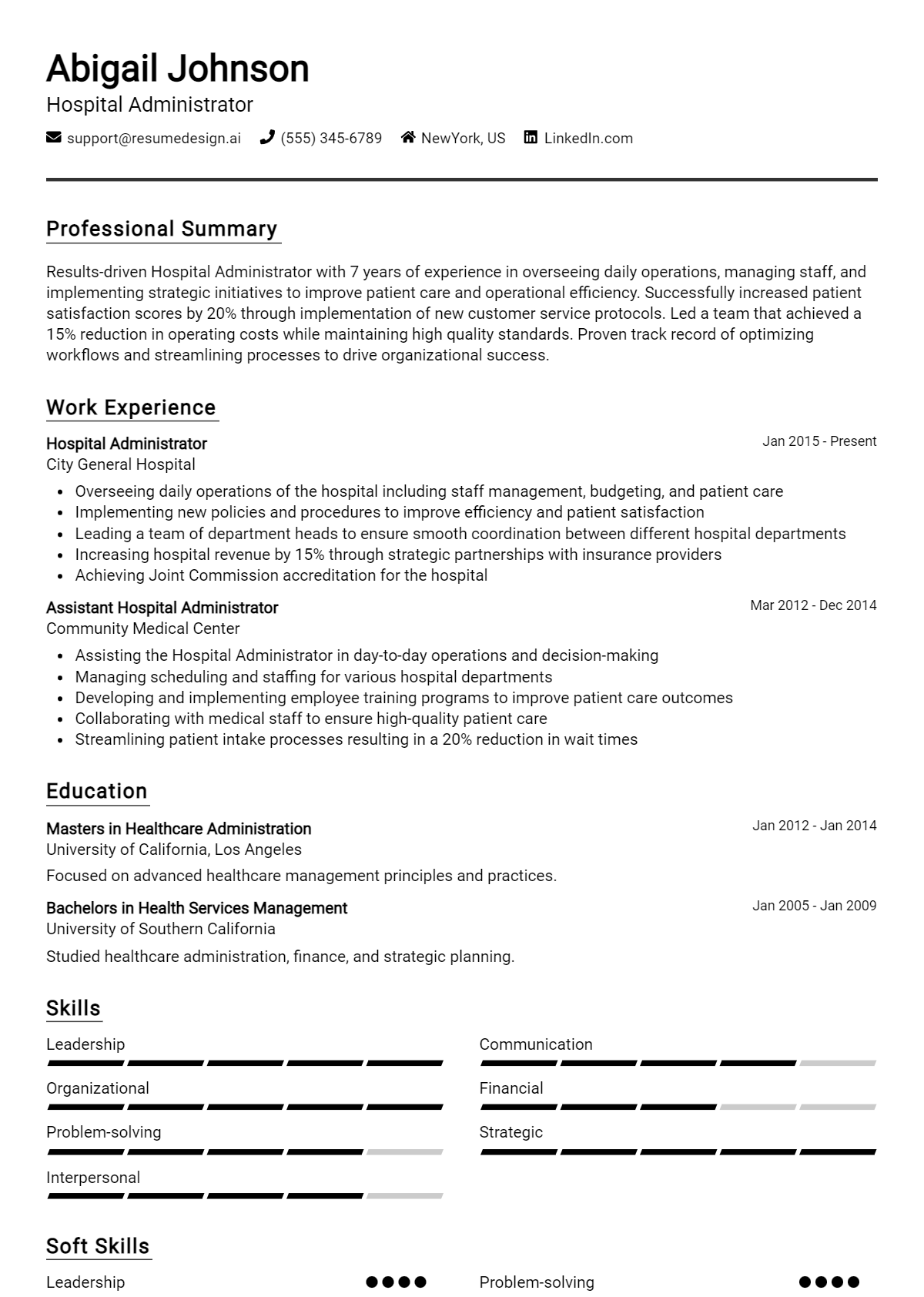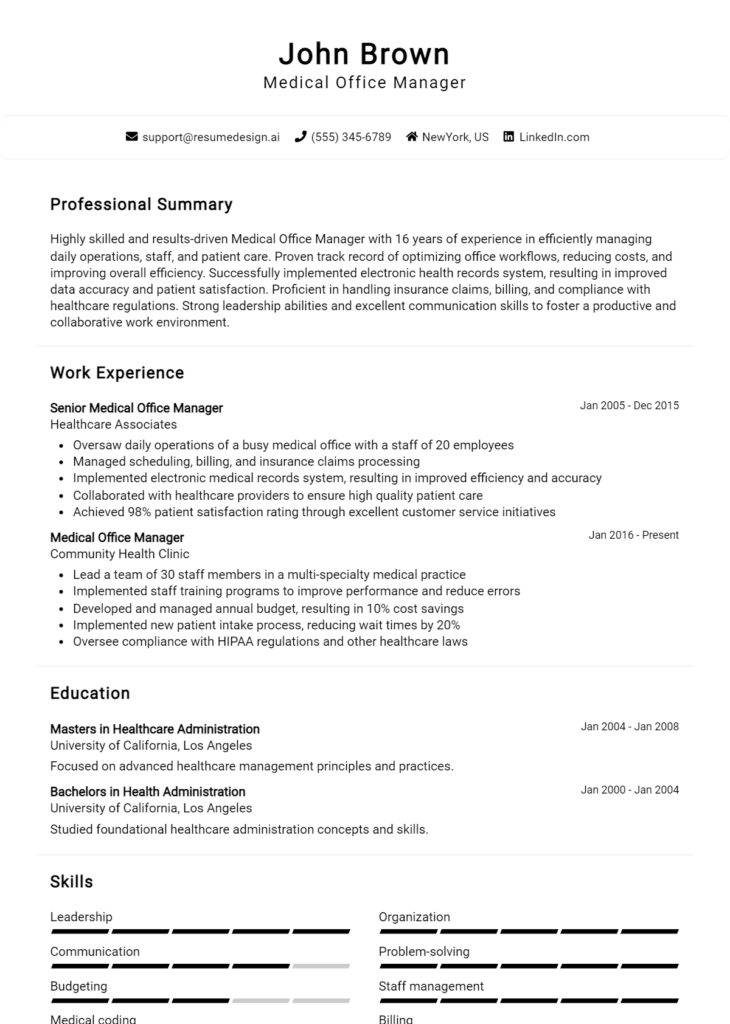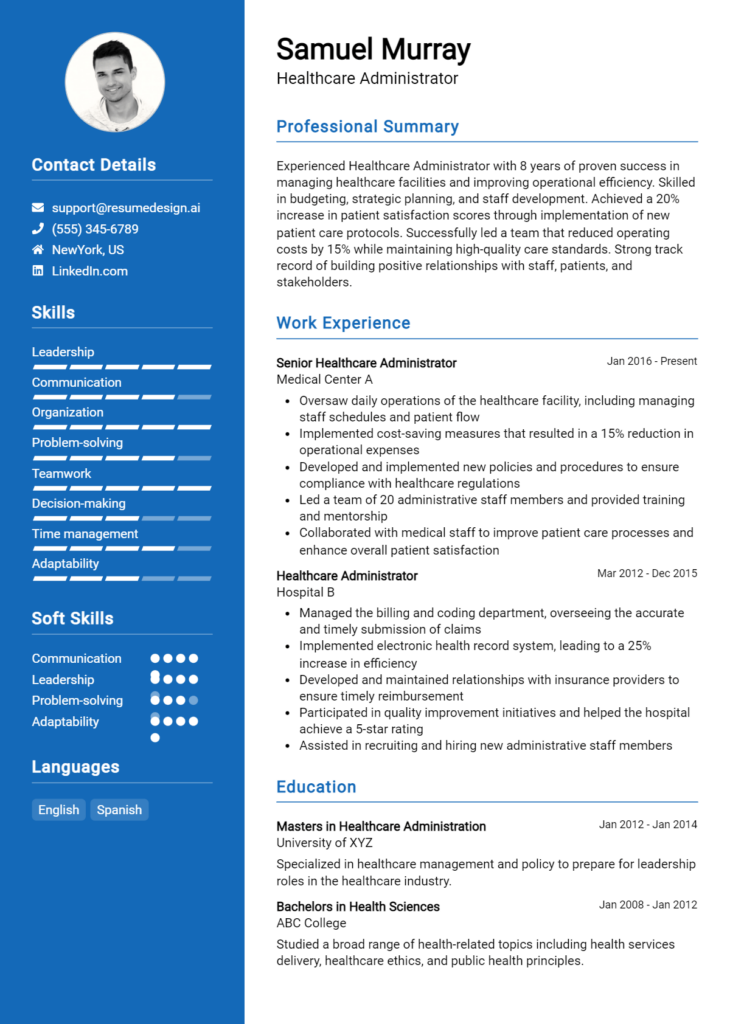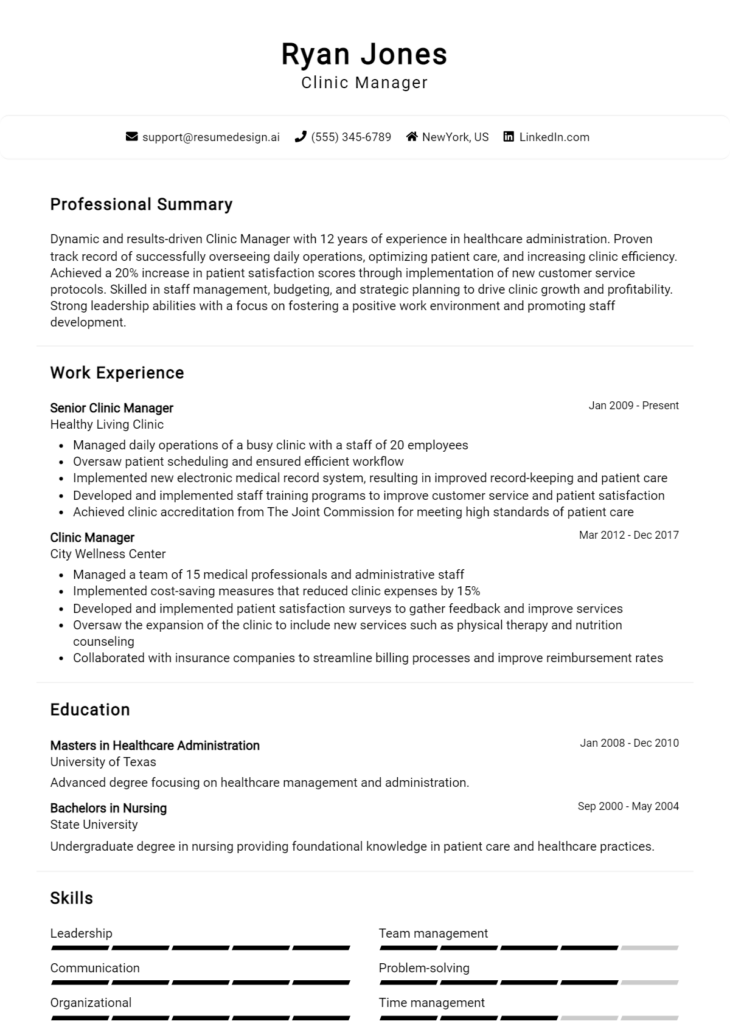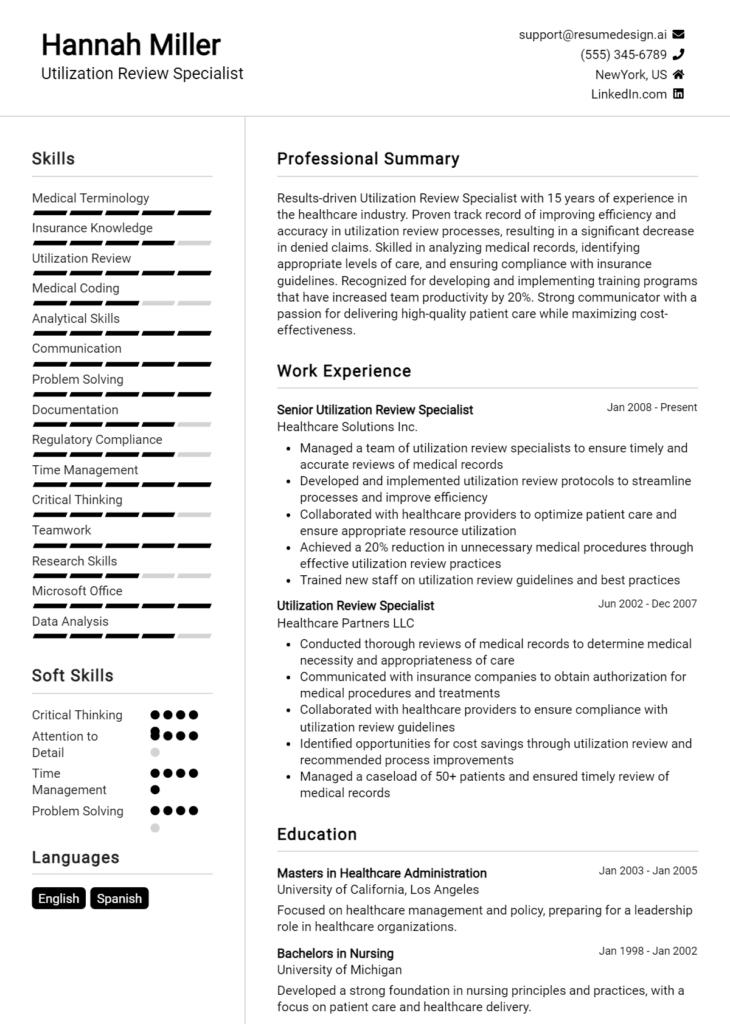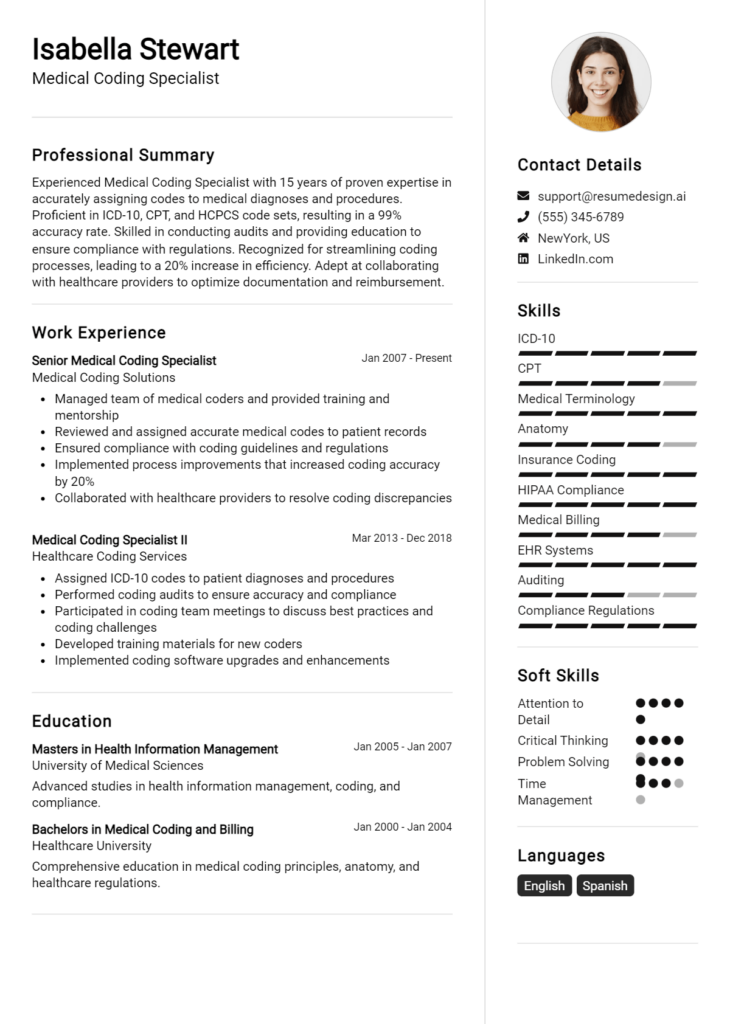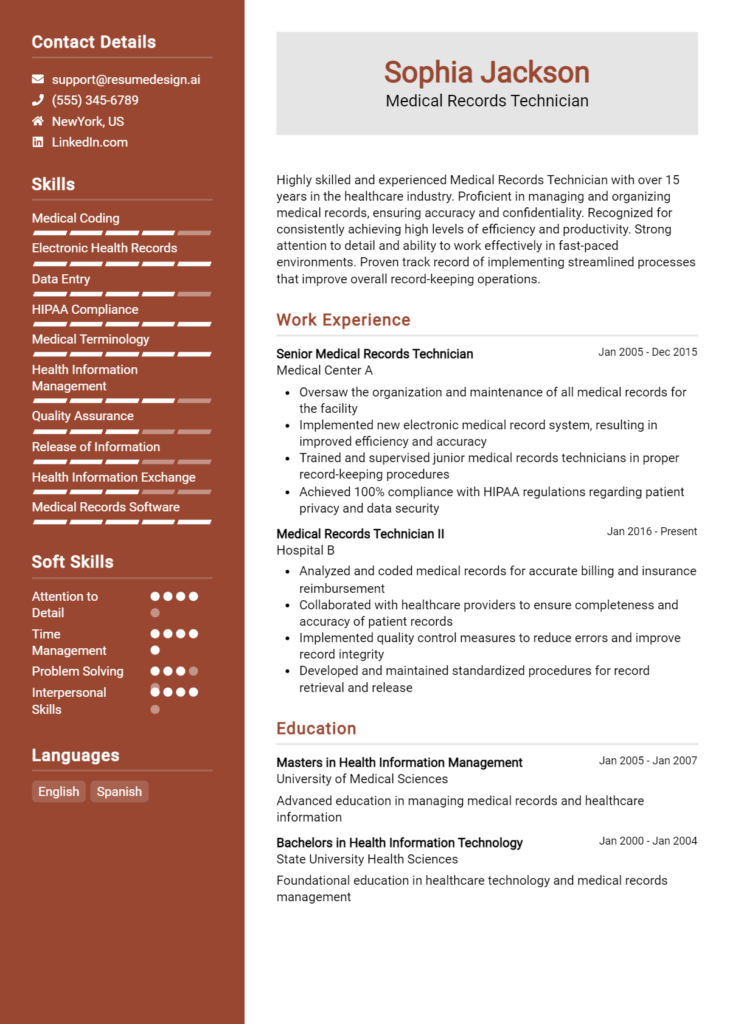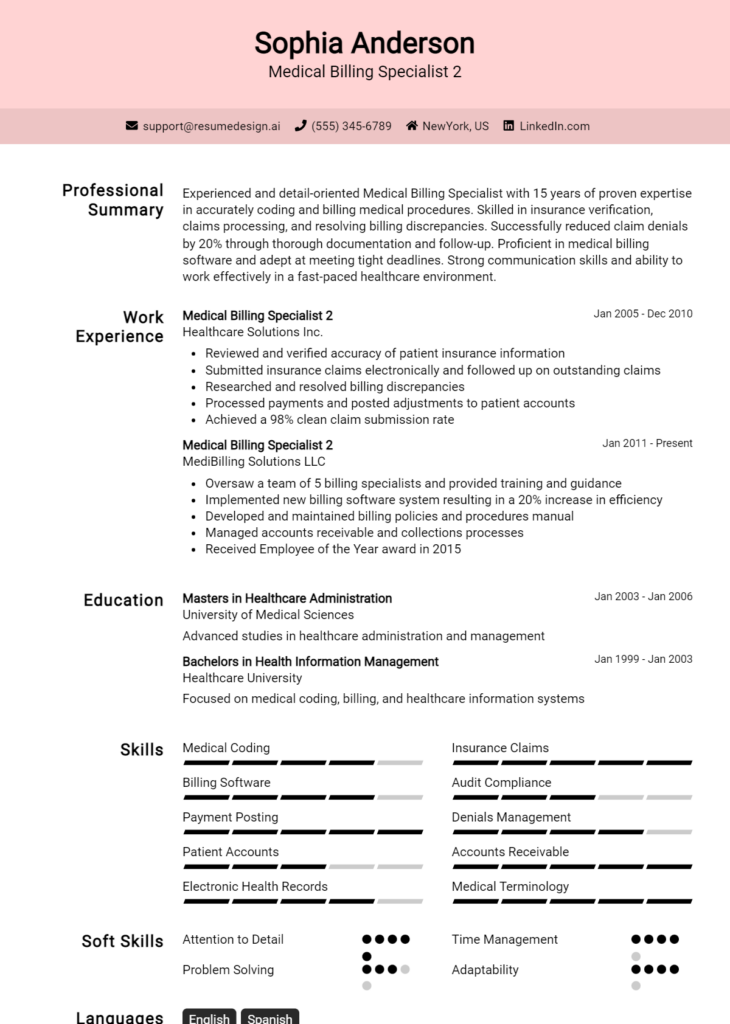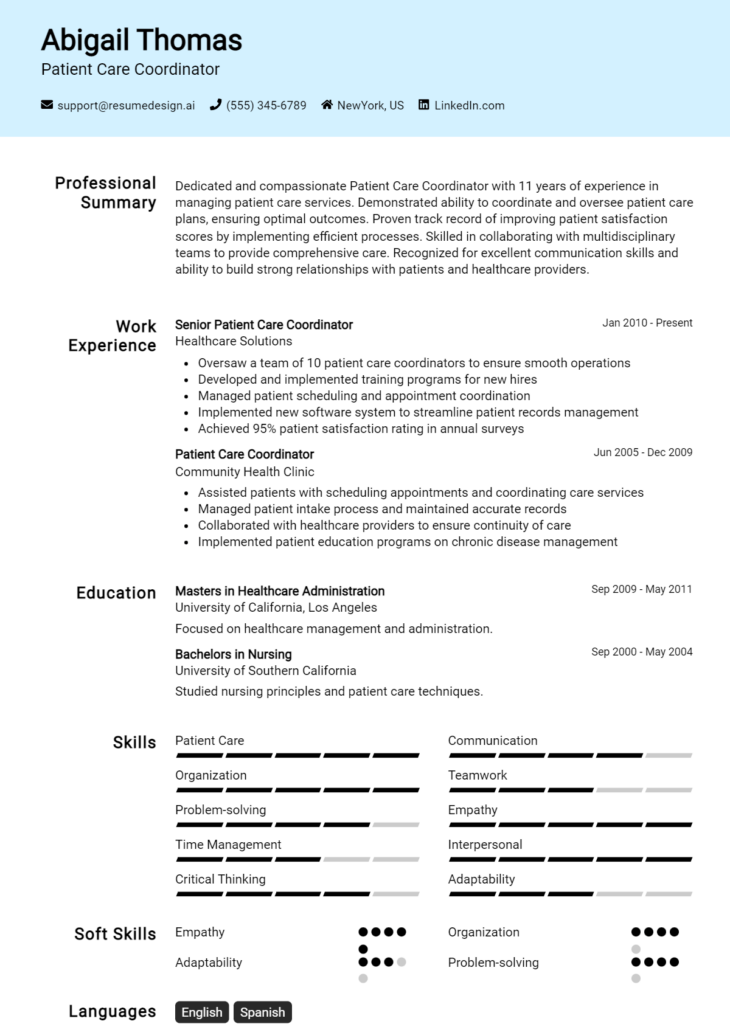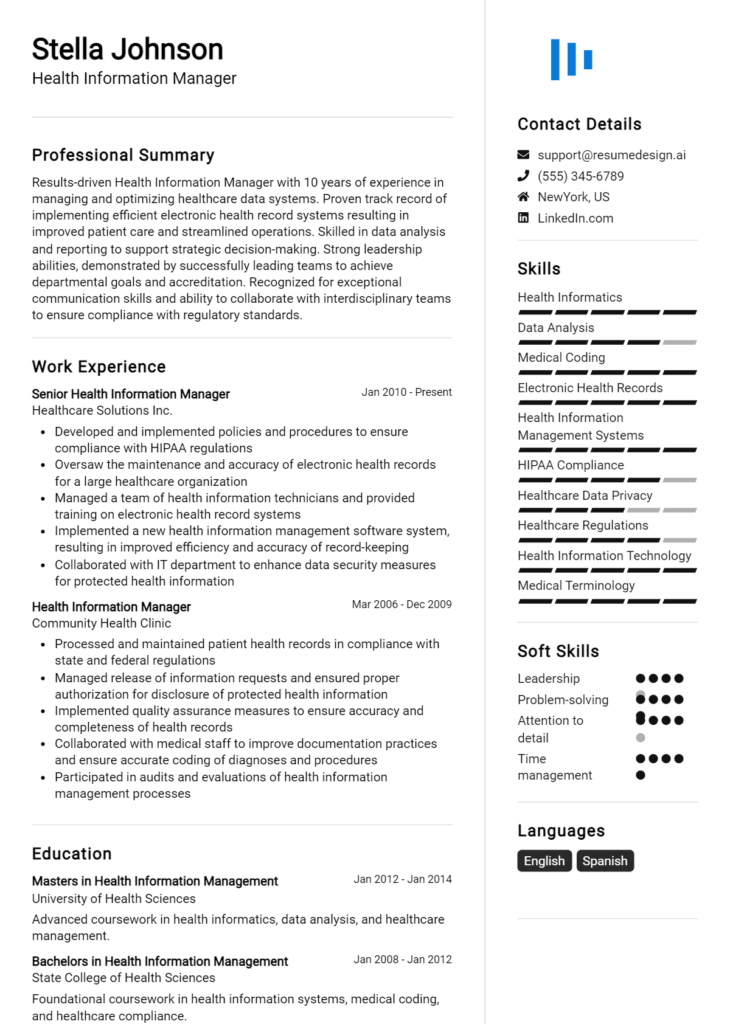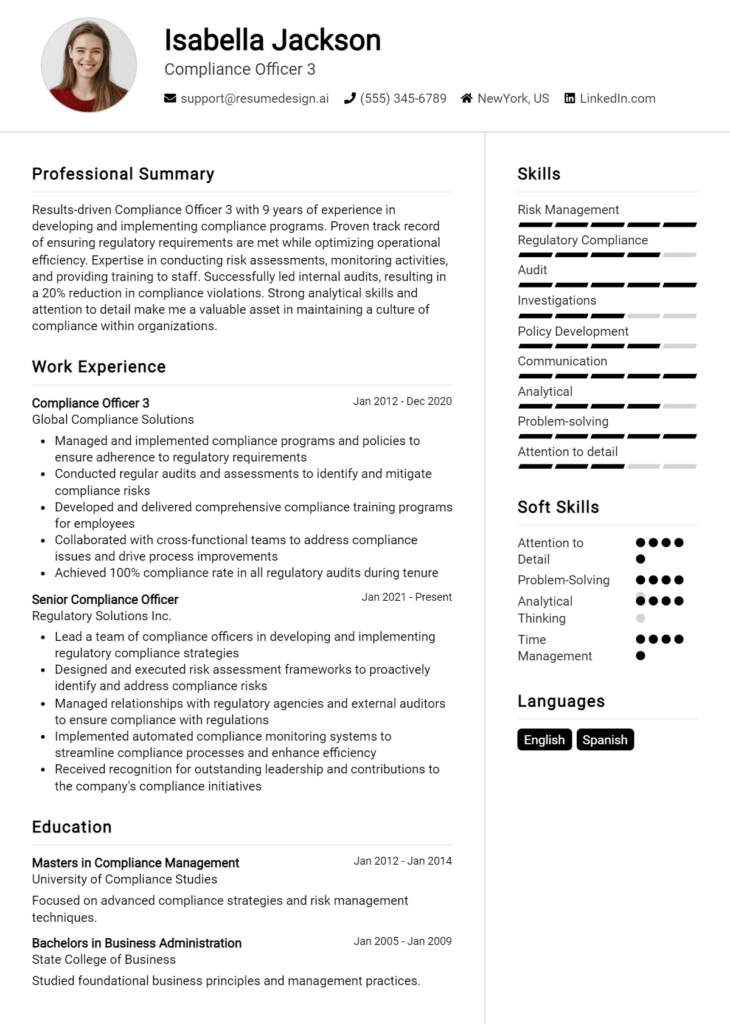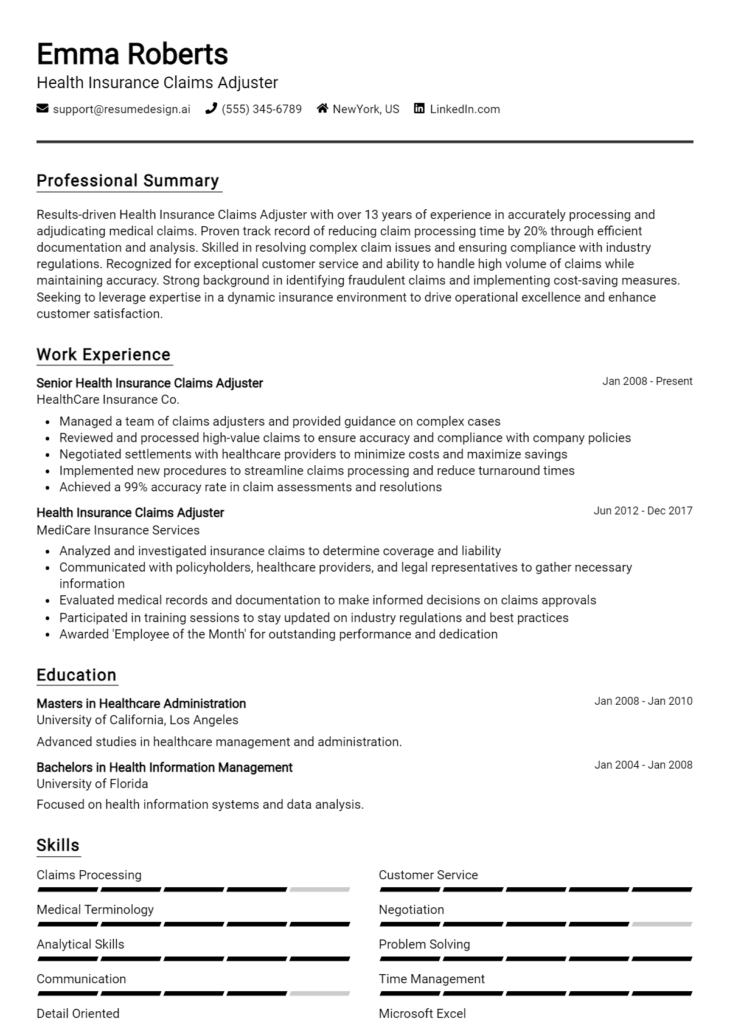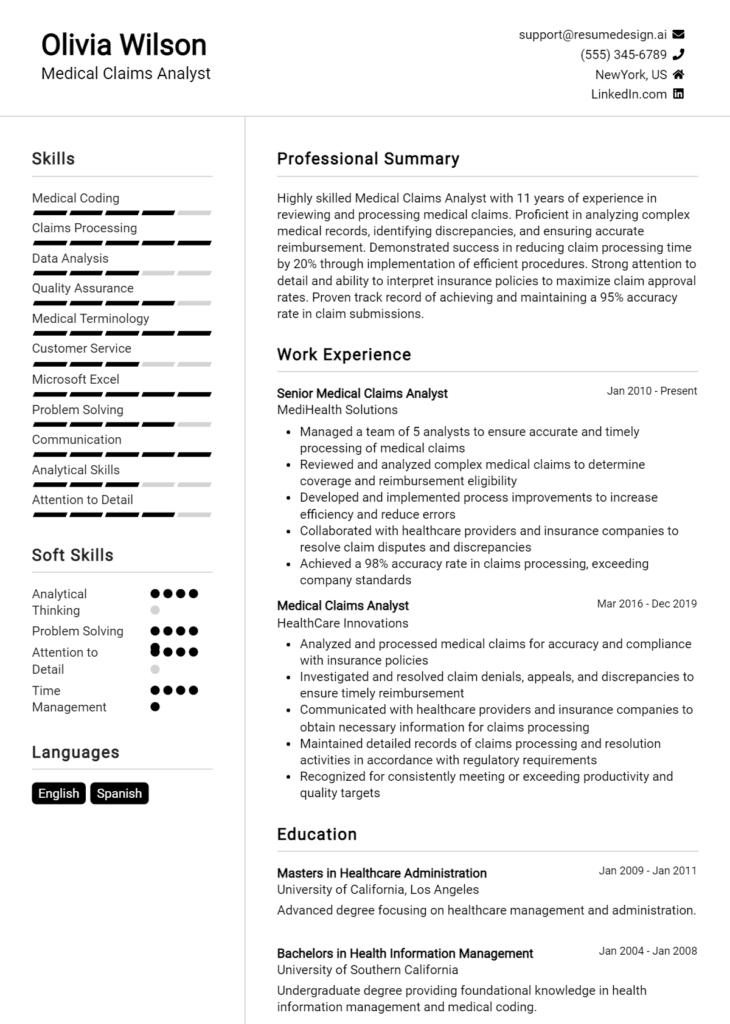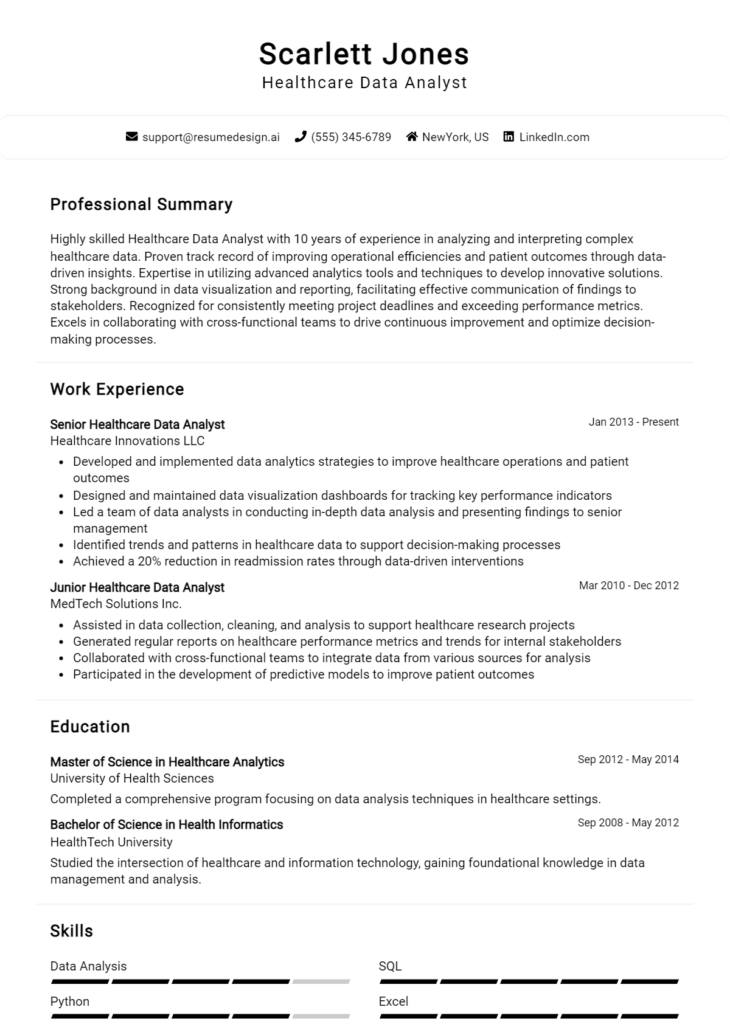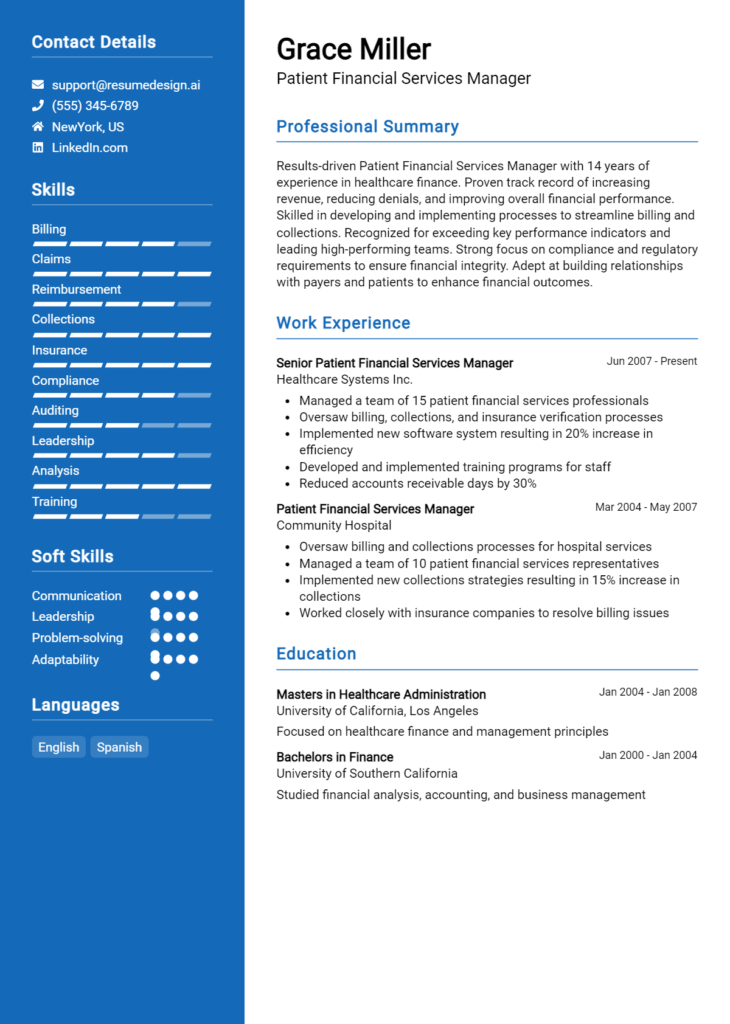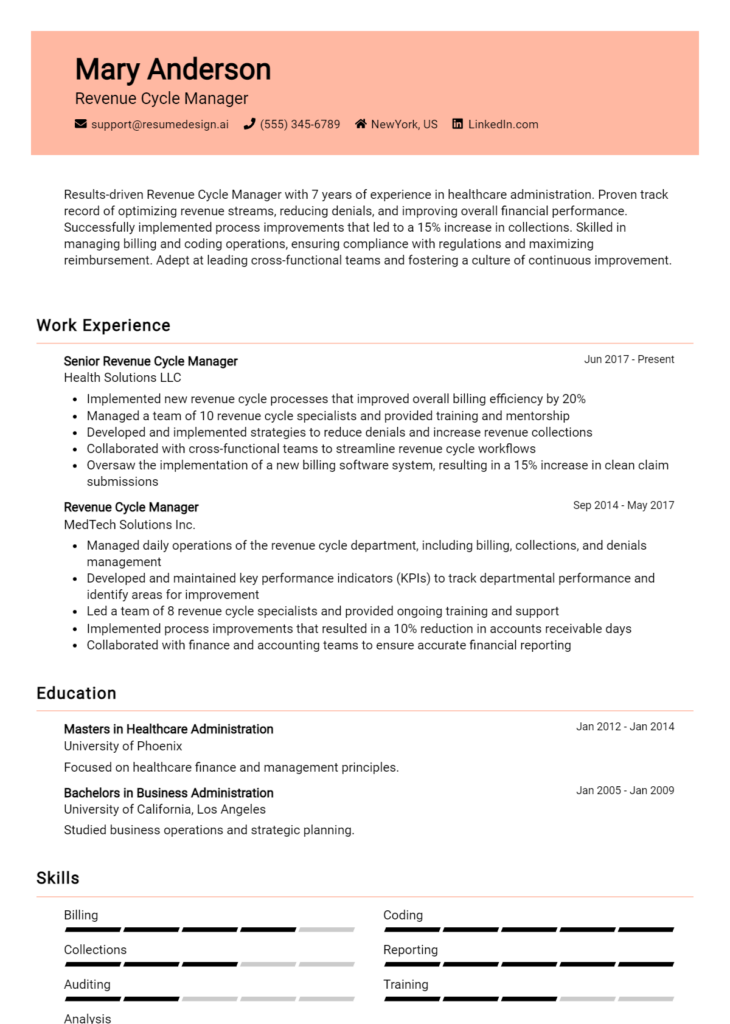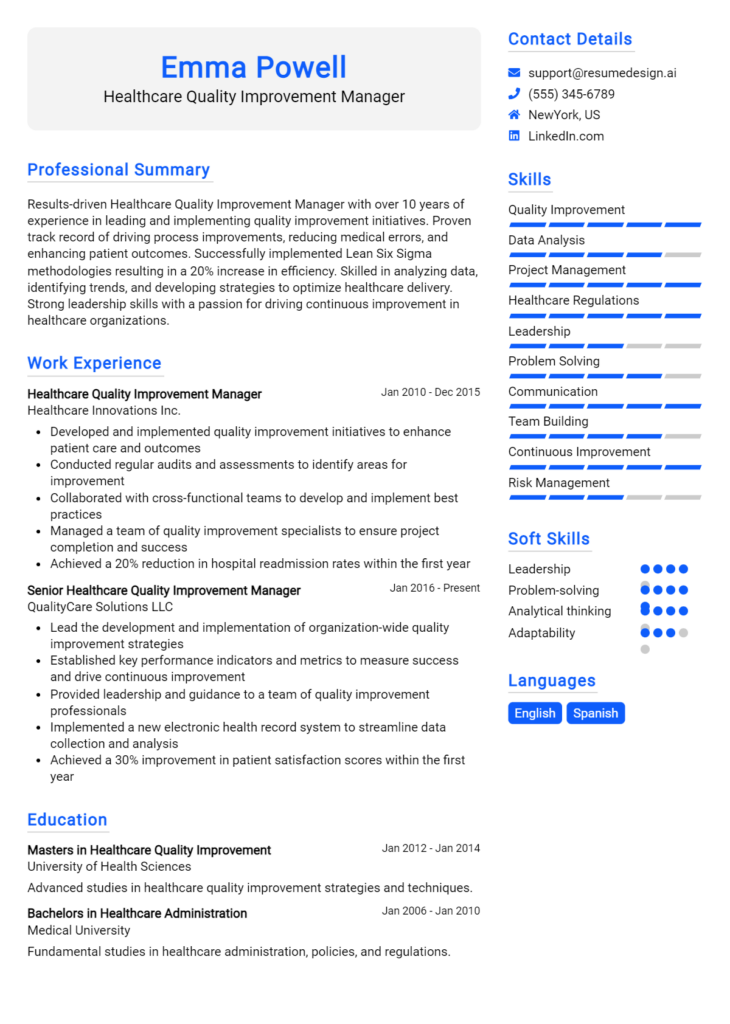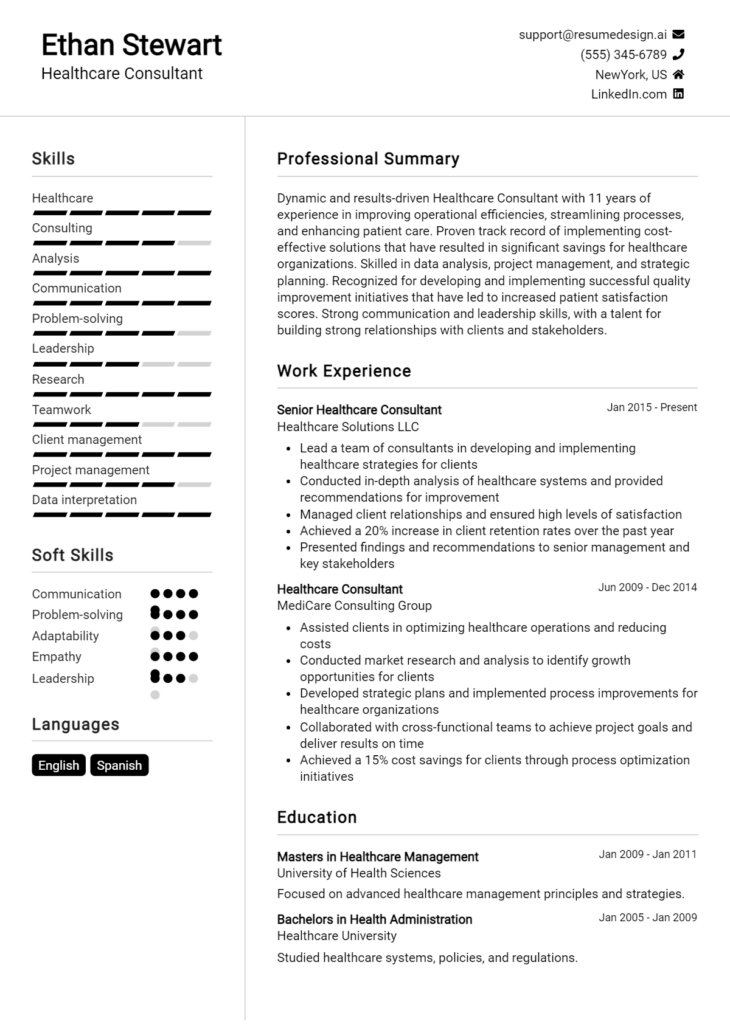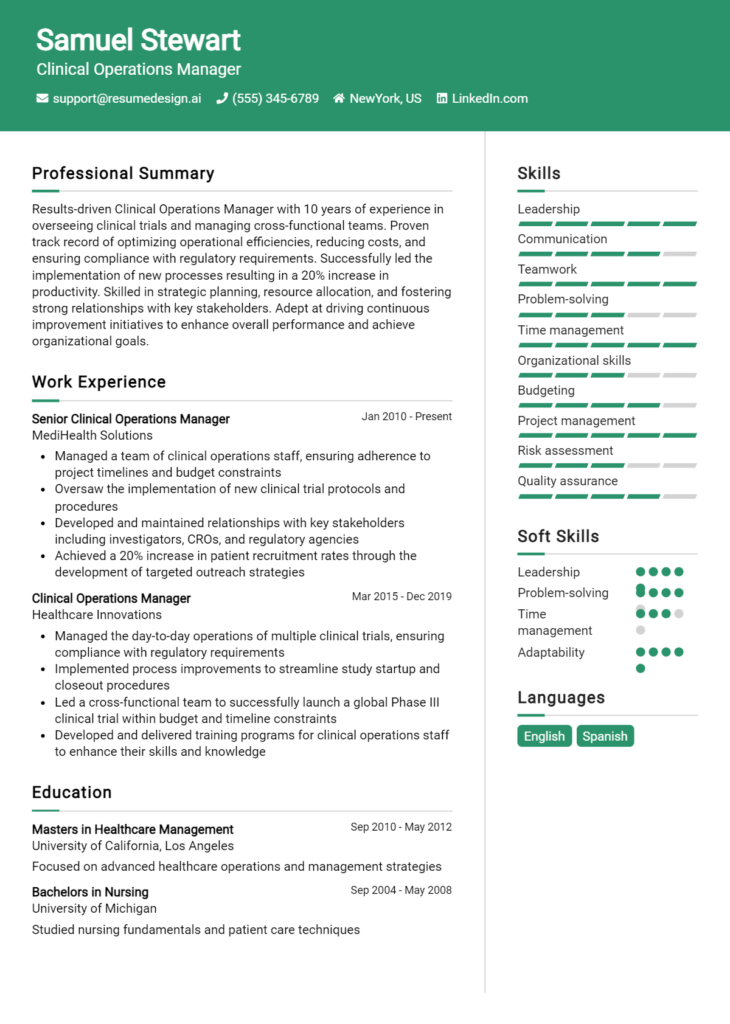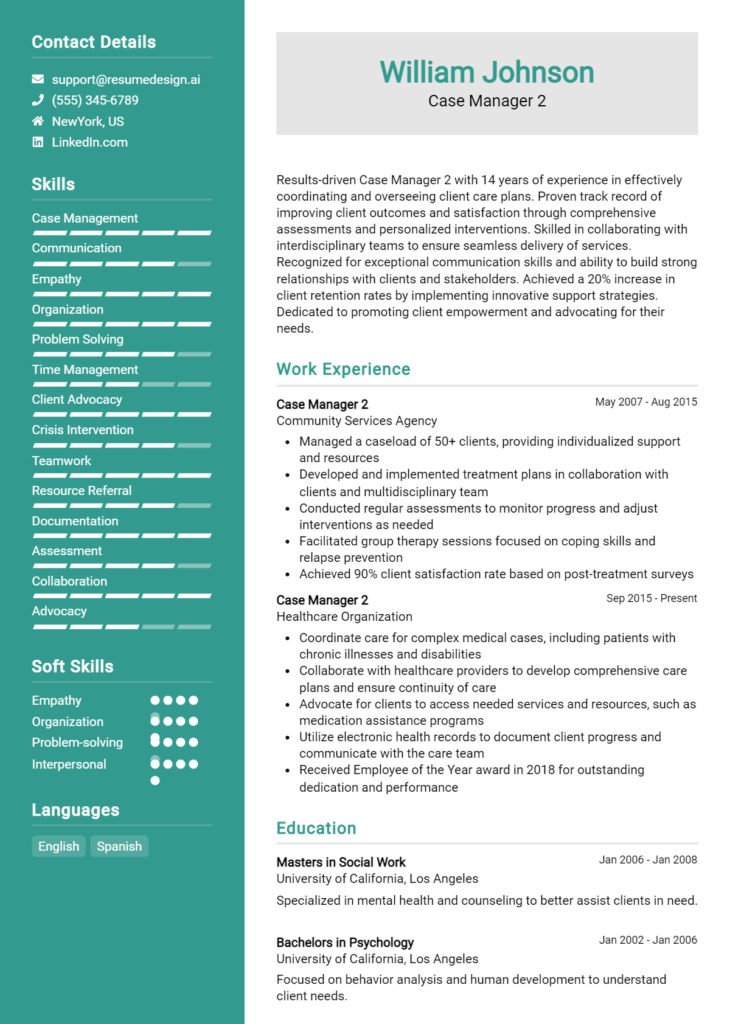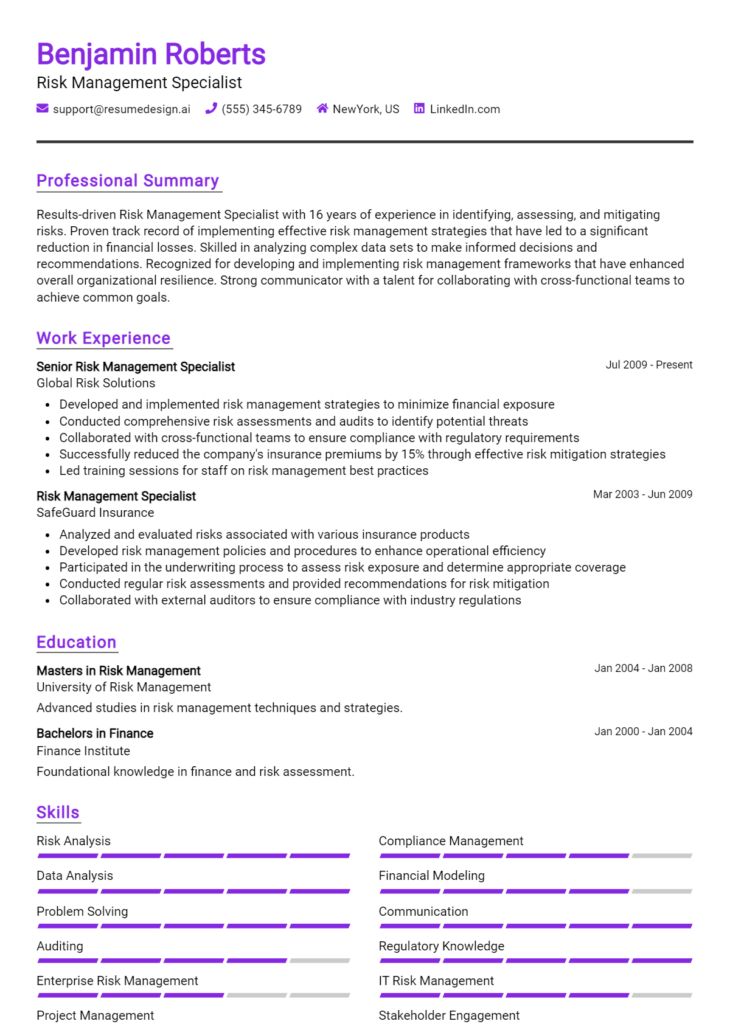Hospital Administrator Core Responsibilities
The Hospital Administrator plays a pivotal role in coordinating various departments within a healthcare facility, ensuring seamless operations and high-quality patient care. Key responsibilities include overseeing budget management, compliance with healthcare regulations, and staff recruitment. This role demands technical proficiency in healthcare systems, operational acumen, and robust problem-solving skills to navigate complex challenges. These competencies contribute significantly to the organization’s goals, and a well-structured resume can effectively highlight these qualifications, showcasing the candidate's expertise and readiness for the position.
Common Responsibilities Listed on Hospital Administrator Resume
- Manage hospital operations and ensure compliance with regulations.
- Develop and implement strategic plans for facility improvement.
- Oversee financial management, including budgeting and cost control.
- Coordinate interdepartmental collaboration to enhance patient care.
- Lead recruitment, training, and staff development initiatives.
- Monitor patient satisfaction and implement improvement strategies.
- Ensure effective communication between management and healthcare staff.
- Analyze data to improve operational efficiency and quality of care.
- Manage vendor relationships and procurement processes.
- Develop policies and procedures to optimize organizational performance.
- Oversee risk management and safety protocols.
- Engage with community stakeholders and promote health initiatives.
High-Level Resume Tips for Hospital Administrator Professionals
In the competitive field of healthcare administration, a well-crafted resume is not just a formality; it is a critical tool that can make or break your chances of securing the ideal role. As a Hospital Administrator professional, your resume serves as the first impression you make on potential employers, encapsulating your skills, experience, and achievements in a concise format. It is essential that your resume reflects not only your qualifications but also your ability to drive efficiency and improve patient care within a healthcare setting. In this guide, we will provide practical and actionable resume tips specifically tailored for Hospital Administrator professionals to help you stand out in this vital industry.
Top Resume Tips for Hospital Administrator Professionals
- Tailor your resume for each job application by aligning your skills and experiences with the specific requirements outlined in the job description.
- Showcase relevant experience prominently, including previous roles in healthcare settings, administrative positions, and any leadership roles that demonstrate your capabilities.
- Quantify your achievements by including metrics and statistics, such as improved patient satisfaction scores, budget reductions, or enhanced operational efficiencies.
- Highlight industry-specific skills such as regulatory compliance, financial management, staff management, and quality assurance.
- Include certifications and training relevant to healthcare administration, such as Fellow of the American College of Healthcare Executives (FACHE) or Certified Healthcare Administrator (CHA).
- Use action verbs and strong language to convey your contributions and impact, making your resume more dynamic and engaging.
- Incorporate keywords from the job posting to ensure your resume passes through applicant tracking systems (ATS) and is seen by hiring managers.
- Keep your resume concise and focused, ideally one page, while ensuring all critical information is effectively communicated.
- Utilize a clean and professional design that enhances readability and reflects the professional nature of the healthcare industry.
By implementing these tips, you can significantly increase your chances of landing a job in the Hospital Administrator field. A well-structured resume that effectively highlights your skills, achievements, and experiences will not only attract the attention of hiring managers but also position you as a strong candidate ready to take on the challenges of healthcare administration.
Why Resume Headlines & Titles are Important for Hospital Administrator
In the competitive field of healthcare, the role of a Hospital Administrator is crucial for ensuring the smooth operation of medical facilities. A well-crafted resume is vital for candidates looking to make a strong impression on hiring managers, and the use of impactful resume headlines and titles can significantly enhance this effort. A strong headline or title acts as a powerful first impression, immediately capturing the attention of employers while succinctly summarizing a candidate's key qualifications and attributes in just a few words. By being concise, relevant, and directly related to the specific job being applied for, these headlines can set the tone for the entire resume and pave the way for further engagement from hiring decision-makers.
Best Practices for Crafting Resume Headlines for Hospital Administrator
- Keep it concise: Aim for one to two impactful lines that summarize your qualifications.
- Be role-specific: Tailor your headline to reflect the specific position you are applying for.
- Highlight key strengths: Include major skills, experiences, or accomplishments that align with the job description.
- Use action-oriented language: Start with strong verbs that convey leadership and initiative.
- Include relevant metrics: If possible, quantify achievements to demonstrate the impact of your contributions.
- Avoid jargon: Use clear language that is easily understood by hiring managers across various backgrounds.
- Make it unique: Differentiate yourself from other candidates with a headline that reflects your unique value proposition.
- Regularly update: Revise your headline as you gain new experience or skills to stay relevant.
Example Resume Headlines for Hospital Administrator
Strong Resume Headlines
"Dynamic Hospital Administrator with 10+ Years of Success in Operational Excellence and Cost Reduction"
“Transformational Leader in Healthcare Management, Improving Patient Care Through Innovative Strategies”
“Results-Driven Healthcare Executive with Proven Track Record in Financial Management and Team Development”
Weak Resume Headlines
“Hospital Administrator Seeking New Opportunities”
“Experienced Professional in Healthcare”
The strong headlines are effective because they immediately convey the candidate's unique value and specific qualifications relevant to the role, making it easy for hiring managers to see why they would be a great fit. They include quantifiable achievements and descriptive language that highlights leadership qualities and expertise. In contrast, the weak headlines fail to impress due to their vagueness and lack of specificity, making it difficult for employers to gauge the candidate's capabilities and potential contributions to the organization.
Writing an Exceptional Hospital Administrator Resume Summary
A well-crafted resume summary is crucial for a Hospital Administrator as it serves as the first impression a candidate makes on hiring managers. This brief yet powerful statement succinctly highlights the candidate's key skills, relevant experience, and significant accomplishments, all of which are essential in a fast-paced healthcare environment. A strong summary quickly captures attention, compelling the reader to delve deeper into the resume. It should be concise, impactful, and tailored specifically to the job description, ensuring that it resonates with the unique needs of the healthcare organization.
Best Practices for Writing a Hospital Administrator Resume Summary
- Quantify Achievements: Use numbers and statistics to highlight your impact, such as improved patient satisfaction scores or budget management.
- Focus on Relevant Skills: Emphasize key skills that align with the job description, such as leadership, strategic planning, and compliance management.
- Tailor Your Summary: Customize your resume summary for each application to reflect the specific requirements and priorities of the employer.
- Highlight Leadership Experience: Showcase your experience in managing teams and driving change within healthcare settings.
- Incorporate Industry Terminology: Use terminology specific to healthcare administration to demonstrate your familiarity with the field.
- Keep it Concise: Aim for 3-5 sentences that clearly convey your qualifications without unnecessary fluff.
- Showcase Professional Development: Mention relevant certifications or ongoing education that enhance your expertise.
- Reflect Core Values: Align your summary with the values of the organization, such as patient-centered care or community engagement.
Example Hospital Administrator Resume Summaries
Strong Resume Summaries
Results-driven Hospital Administrator with over 10 years of experience in managing healthcare operations, achieving a 20% increase in patient satisfaction ratings through strategic process improvements and staff training initiatives.
Dynamic healthcare leader with a proven track record of reducing operational costs by 15% while enhancing service delivery in a 300-bed facility, leveraging data analytics to drive decision-making.
Accomplished Hospital Administrator skilled in navigating regulatory compliance and implementing quality improvement programs that led to a 30% reduction in patient readmission rates over two years.
Innovative leader with expertise in financial management and strategic planning, successfully overseeing a $10 million budget and achieving a 25% increase in departmental efficiency through process re-engineering.
Weak Resume Summaries
Experienced hospital administrator looking for new opportunities in healthcare management.
Dedicated professional with skills in administration and a passion for improving healthcare services.
The strong resume summaries are considered effective because they provide specific, quantifiable achievements that demonstrate the candidate's impact and relevance to the role. They highlight critical skills and show a clear understanding of the healthcare environment. In contrast, the weak summaries lack detail and specificity, making them too generic to capture the interest of hiring managers. They fail to showcase any measurable results or unique qualifications, which diminishes their overall effectiveness.
Work Experience Section for Hospital Administrator Resume
The work experience section of a Hospital Administrator resume is crucial as it serves as a reflection of the candidate's professional journey, showcasing their technical skills, leadership capabilities, and the ability to deliver high-quality healthcare products and services. This section not only highlights the applicant's previous roles but also provides concrete evidence of their achievements and contributions to healthcare organizations. By quantifying results and aligning experiences with industry standards, candidates can effectively demonstrate their value to potential employers and their readiness to tackle the complexities of healthcare administration.
Best Practices for Hospital Administrator Work Experience
- Highlight specific technical skills relevant to hospital administration, such as healthcare management software proficiency or regulatory compliance knowledge.
- Quantify achievements with metrics, such as percentage improvements in patient satisfaction or reductions in operational costs.
- Focus on leadership roles and team management experience, emphasizing your ability to lead diverse teams effectively.
- Showcase collaboration efforts with other departments, highlighting cross-functional projects and partnerships that led to improved outcomes.
- Use action verbs to start each bullet point, conveying a sense of proactivity and impact.
- Align experiences with industry standards and current trends in healthcare administration to exhibit knowledge of the field.
- Keep descriptions concise yet informative, ensuring clarity and readability for hiring managers.
- Tailor your work experience to match the specific requirements of the job you are applying for, emphasizing relevant experiences.
Example Work Experiences for Hospital Administrator
Strong Experiences
- Successfully led a team of 15 in implementing an electronic health record (EHR) system, resulting in a 30% reduction in patient data entry errors within the first year.
- Managed a $5 million budget, achieving a 20% decrease in operational costs through strategic resource allocation and vendor negotiations.
- Collaborated with clinical staff to develop a patient satisfaction initiative that improved survey scores by 25% over two years.
- Oversaw the accreditation process for the hospital, leading to a successful reaccreditation with no deficiencies noted, enhancing the hospital's reputation and funding opportunities.
Weak Experiences
- Helped with hospital operations and worked with staff.
- Responsible for managing budgets and overseeing projects.
- Participated in meetings about hospital administration tasks.
- Assisted in improving patient care services.
The examples provided illustrate a clear distinction between strong and weak experiences. Strong experiences are characterized by specific achievements, quantifiable outcomes, and a clear demonstration of leadership and collaboration, all of which provide insight into the candidate's capabilities and contributions. In contrast, weak experiences lack detail and fail to convey the candidate’s impact, making them less compelling to potential employers. Strong examples are actionable and concrete, while weak examples are vague and unimpressive.
Education and Certifications Section for Hospital Administrator Resume
The education and certifications section of a Hospital Administrator resume plays a crucial role in establishing a candidate's qualifications and readiness for the position. This section not only showcases the academic background of the applicant but also highlights industry-relevant certifications and ongoing learning efforts that are essential in the ever-evolving healthcare landscape. By providing information on relevant coursework, specialized training, and certifications, candidates can enhance their credibility and demonstrate their commitment to maintaining a high standard of professional excellence within the hospital administration field.
Best Practices for Hospital Administrator Education and Certifications
- Include relevant degrees such as a Master's in Healthcare Administration or Business Administration.
- List industry-recognized certifications, such as Fellow of the American College of Healthcare Executives (FACHE) or Certified Healthcare Financial Professional (CHFP).
- Highlight any specialized training in healthcare management, policy, or quality improvement.
- Provide specific coursework related to healthcare laws, ethics, and finance to demonstrate depth of knowledge.
- Keep the section concise, focusing on certifications and education most relevant to the hospital administration role.
- Update the section regularly to reflect any new certifications or degrees earned.
- Consider including the dates of completion to show the relevance and recency of qualifications.
- Use bold or italics to emphasize key credentials and make them stand out visually.
Example Education and Certifications for Hospital Administrator
Strong Examples
- Master of Health Administration (MHA), University of California, 2021
- Certified Healthcare Executive (CHE), American College of Healthcare Executives, 2022
- Healthcare Management Certification Program, Harvard University, 2020
- Bachelor of Science in Nursing (BSN), University of Texas, 2015
Weak Examples
- Associate Degree in General Studies, Community College, 2010
- Certification in Medical Billing (outdated), 2015
- High School Diploma, 2005
- Certification in First Aid and CPR, 2018
The strong examples are considered effective because they showcase relevant degrees and certifications that align directly with the responsibilities and expertise required for a Hospital Administrator. These credentials indicate a solid educational foundation and ongoing professional development within the healthcare field. In contrast, the weak examples demonstrate a lack of relevance to the role, featuring outdated or unrelated qualifications that do not meet the expectations of a Hospital Administrator position. Therefore, it is critical for candidates to focus on education and certifications that truly reflect their qualifications for the job.
Top Skills & Keywords for Hospital Administrator Resume
In the competitive field of healthcare management, a well-crafted resume for a Hospital Administrator must highlight specific skills that demonstrate both expertise and the ability to navigate complex environments. Skills play a crucial role in showcasing a candidate's qualifications and readiness to tackle the challenges of hospital administration, which includes ensuring operational efficiency, compliance with healthcare regulations, and effective team leadership. A blend of hard and soft skills not only enhances the resume but also reflects a candidate's capability to lead healthcare teams and improve patient care. For a comprehensive overview of essential skills, visit skills and learn how to effectively integrate your work experience into your resume.
Top Hard & Soft Skills for Hospital Administrator
Soft Skills
- Leadership
- Communication
- Problem-solving
- Interpersonal skills
- Decision-making
- Time management
- Adaptability
- Conflict resolution
- Strategic thinking
- Emotional intelligence
- Team collaboration
- Patient-centered focus
- Negotiation skills
- Cultural competence
- Stress management
Hard Skills
- Healthcare regulations knowledge
- Budgeting and financial management
- Quality assurance and improvement
- Data analysis and reporting
- Electronic Health Record (EHR) systems
- Project management
- Risk management
- Human resources management
- Compliance and accreditation standards
- Facility management
- Medical coding and billing
- Health information management
- Performance metrics evaluation
- Strategic planning
- Supply chain management
- Information technology proficiency
- Patient safety protocols
- Clinical operations management
Stand Out with a Winning Hospital Administrator Cover Letter
As a highly motivated and results-driven professional with over five years of experience in hospital administration, I am excited to apply for the Hospital Administrator position at [Hospital Name]. My background in healthcare management, coupled with my commitment to enhancing patient care and operational efficiency, positions me as a strong candidate to lead your organization in achieving its strategic goals. I am particularly drawn to [Hospital Name] because of its reputation for innovation and excellence in patient services, and I am eager to contribute to its continued success.
In my previous role as Assistant Hospital Administrator at [Previous Hospital Name], I successfully managed a diverse range of responsibilities, including overseeing budgetary processes, optimizing resource allocation, and enhancing patient care protocols. My collaborative approach has allowed me to work effectively with multidisciplinary teams to implement initiatives that improved patient satisfaction scores by 20% over two years. I am adept at leveraging data-driven insights to inform decision-making and develop strategies that align with both clinical and operational objectives.
Furthermore, my strong leadership skills have enabled me to mentor and develop staff, fostering a culture of continuous improvement and accountability. I believe that empowering healthcare teams is essential to delivering high-quality services and achieving organizational goals. I am particularly proud of my role in implementing a new electronic health record system that streamlined operations and significantly reduced patient wait times, demonstrating my commitment to using technology to enhance patient care.
I am enthusiastic about the opportunity to bring my expertise in healthcare administration to [Hospital Name]. I am confident that my proactive approach, strategic mindset, and passion for community health will contribute positively to your team. I look forward to the possibility of discussing how I can help [Hospital Name] continue to excel in providing exceptional healthcare services. Thank you for considering my application.
Common Mistakes to Avoid in a Hospital Administrator Resume
When crafting a resume for a Hospital Administrator position, it's crucial to present a clear, professional, and tailored document that reflects your qualifications and experiences. However, many candidates make common mistakes that can hinder their chances of landing an interview. Avoiding these pitfalls can help ensure that your resume stands out positively in a competitive job market.
Generic Objective Statement: Using a vague or generic objective can make it seem like you’re not genuinely interested in the specific position or organization. Tailor your objective to reflect your career goals and how they align with the hospital’s mission.
Neglecting Relevant Experience: Failing to highlight relevant experiences, such as previous administrative roles or healthcare management positions, can weaken your application. Ensure that your most pertinent experiences are prominently featured.
Overloading with Jargon: While medical terminology is important in the healthcare field, overusing jargon can confuse recruiters who may not be as familiar with specific terms. Aim for clarity and simplicity in your language.
Inconsistent Formatting: A resume that lacks consistent formatting, such as varying font sizes or styles, can appear unprofessional. Maintain a uniform layout, using the same font and size throughout, to enhance readability.
Ignoring Quantifiable Achievements: Listing responsibilities without quantifying your achievements can make your contributions seem less impactful. Use metrics and specific examples to demonstrate your effectiveness in previous roles.
Typos and Grammatical Errors: Simple mistakes, such as typos or grammatical errors, can undermine your professionalism. Proofread your resume multiple times and consider asking a colleague to review it as well.
Lengthy Resume: Submitting an excessively long resume can overwhelm hiring managers. Aim for a concise document, ideally one to two pages, focusing on the most relevant information to the position.
Lack of Customization: Using the same resume for multiple applications can be detrimental. Tailor your resume for each position to emphasize the skills and experiences that are most relevant to the job you are applying for.
Conclusion
As a Hospital Administrator, your role is pivotal in ensuring the efficient operation of healthcare facilities. You oversee various departments, manage budgets, and ensure compliance with health regulations while striving to improve patient care. The importance of your position cannot be overstated, as you are responsible for not only the administrative tasks but also for fostering a positive environment for both staff and patients.
In this article, we covered several key aspects of the Hospital Administrator role, including essential skills such as leadership, strategic planning, and financial management. We also discussed the necessity of effective communication and the ability to navigate the complexities of healthcare policies and regulations. It’s vital to continuously update your knowledge and skills to stay relevant in this ever-evolving field.
As you reflect on your qualifications and experiences, take a moment to evaluate your Hospital Administrator resume. Ensure that it highlights your achievements, showcases your skills, and aligns with the demands of the position.
To assist you in refining your resume, consider utilizing available tools such as resume templates, which provide a structured format to present your information effectively. Additionally, a resume builder can simplify the process, allowing you to create a professional-looking resume in no time. Don’t forget to explore resume examples to gather inspiration and insights into what works best in your field. Lastly, a well-crafted cover letter template can complement your resume by providing a narrative to your qualifications and aspirations.
Take charge of your career today by reviewing and enhancing your resume. The right tools are at your disposal to help you make a great impression in your next job application!

